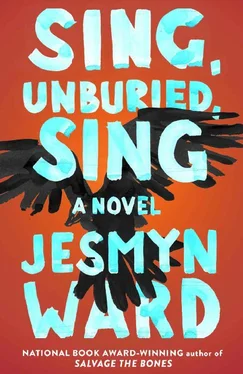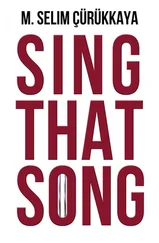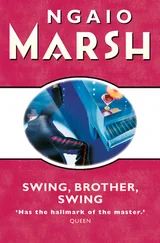The boy looks at Kayla like she’s his dog, and Kayla hops closer.
“Hi,” she says again. There is a worm of snot running down the boy’s face. He jumps up to stand in the recliner, and seems to make a decision because he smiles, and his teeth are all capped with silver, the metal stopping them from rotting out of his mouth. He begins jumping in the chair like it’s a trampoline, and a few of the boxes stacked to the side of the chair wobble.
“Don’t get up there, Kayla.” They’ll both fall out. I know it. Kayla ignores me and swings one leg up and pulls herself into the chair, where the two begin talking to each other and jumping, having a conversation. I catch words: chair, TV , candy, all gone, move . I cup my hand around my ear, look at the women in the kitchen, watch the way their mouths move, and try to hear.
“I was sleep. That’s why I didn’t hear y’all at first. We all been sick back here.”
“It’s the weather,” Misty says. “One day it’s freezing, the next it’s in the eighties. Damn Mississippi spring.”
The woman nods, drinks a plastic cup of something, clears her throat.
“Where Fred?” Misty asks.
“Out back, working.”
“Business still good?”
“It’s booming, baby,” the woman says, then coughs.
Leonie is worrying the table with her hands.
“The warmer it gets, the better it gets.”
“You still got me?” Misty says.
The woman nods.
“Y’all want something to drink?” she asks.
“You got a cold drink?” Misty asks. The woman hands her a Sprite. I remember how thirsty I am, but I won’t say anything. Leonie would kill me.
“No thanks,” Leonie says, and the only reason I know it’s what she’s said is because I read her lips and the shake of her head. She speaks so low.
“You sure?” Misty asks her.
Leonie shakes her head.
“We need to get back on the road soon.”
There are cases of cold drinks stacked up against the wall in the kitchen: Coke and Dr Pepper and Barq’s and Fanta. When we drove up, I never would have imagined this much plenty in one house: it is stuffed with it, so much food and so many things, so much bulk: cases of soup, cases of crackers, cases of toilet paper and paper towels, three microwaves still in the box, rice cookers, waffle makers, pots. So much food the boxes of it reach to the ceiling in the living room, so many appliances, they are as tall as the lights in the kitchen. I am hungry and thirsty: my throat a closing hand, my stomach a burning fist. And Leonie at the table, Leonie who doesn’t usually care whether we accept food when it’s offered, Leonie who normally will take everything given to her with an open hand—now she says no. Now, when the goat and rice I ate is silt in my gut.
The woman crosses her arm over her chest and frowns. She’s trying to keep the coughs inside, but they come out in sputters. She shakes her head, and I know what she’s thinking because I can see it in the way she’s standing and staring at Leonie. Rude.
* * *
If Pop was here, he wouldn’t call this boy no rascal . Wouldn’t call him a scalawag neither. And he definitely wouldn’t call him boy . He’d call him bad ass . Because he is. He’s tired of playing Kayla’s game of chase, so he’s stopped running. He crouches in front of the television, turns on one of his four game systems, and begins playing a game. It’s Grand Theft Auto, and he doesn’t know how to play it. He drives the car over medians, into stores, gets out of the car at stoplights and runs. Kayla is bored. She walks back over to me and climbs into my lap, grabbing a bunch of my shirt, and begins talking to me seriously about wanting juice and graham crackers, so I can’t see the women, can’t see the glass of water that Leonie drinks now that she’s been bullied into accepting something, can’t see Misty and the woman leaning toward each other over the table, whispering to each other. Drawing pictures on the table with their fingers.
The boy is screaming at the television. His video game has frozen.
“No! No!” he yells, in a voice that sounds like his nose is stuffed with snot.
The boy’s car has sailed off a road that winds around a cliff. The car has jumped the railing but is frozen in the air. The car is red with a white stripe down the middle of it, splitting it in two. The boy punches the buttons on the controls, but the game does nothing.
“Take it out,” the woman yells from the table.
“No!”
“Start it over,” the woman says, and then bends toward Misty again.
The boy throws the controller at the television. It hits and clatters to the floor. He bends and begins fiddling with the game station, pressing buttons, but nothing changes.
“Don’t want to lose my spot!” he yells.
The women ignore him.
Kayla jumps up from my lap and bends to pick up a blue plastic ball from the floor, about the size of two of her fists, and starts playing with it.
“If you take it out, it won’t lose your spot. It’ll save it,” I say.
I know this not because I have a game system, but because I played Michael’s when he lived with us, so I know how they work. He took it with him when he left. The boy ignores me. He makes a sound halfway between a cry and a growl in his throat, something gurgling and whiny, and when he comes up in front of the shelf of game systems, he doesn’t stand or turn around and begin playing with Kayla again. He doesn’t grab another ball off the floor, a black one or a green one or a red one, all that I can see, and roll one toward us. He stands up and punches the TV. He hits it with his right hand first, then his left, and then his right, windmilling his arms so that his small fists connect with the plastic so hard it sounds like it’s cracking. It is cracking. His fist hits again and there is a firework on the car that bursts and stays, one shot through with white and yellow and red. He hits with his left and it does nothing, but then he hits with his right again and there is another firework burst on the car. It stays.
“What are you doing?” the woman yells from the kitchen. She’s half risen from the table. “You better not be messing with them boxes again!”
The boy hits again with his left. Nothing.
“What I say!” the woman yells, and she’s all the way standing now. The boy bends to the floor, grabs a T-ball bat, and swings. There’s a loud crunch, the sound of glass and plastic cracking, and for one moment, the entire car is one brilliant burst of fireworks, and then the TV winks black, and there is nothing on the screen, but before the screen there is the woman and the boy. She stalks past Kayla, who runs and launches herself into my lap and grabs my shirt with both hands, and corners the boy in front of the TV. He turns with the bat and whacks her on the left leg with it.
“MotherFUCK!” she half coughs and screams, and then she grabs the bat from him. She picks up the boy by one arm and holds the bat with another and yells, “What did you do?” Each word is a swing. Each swing makes the boy run. He shrieks. “What did you do!”
The boy’s legs are red wherever she hits him with the bat. He laps the woman like a horse on a merry-go-round, his face like that: open mouth, grimace, rictus. She hits him so many times, his cry goes silent but that mouth is still open. I know what he is saying: Pain, please, no more pain please . The woman drops the bat and the boy’s arm all at once, the bat dropping in a straight line to the floor, the boy sagging into a heap.
“Wait till your daddy come out the shed. He’s going to kill you.”
Leonie walks across the living room and takes Kayla from me. When she talks, she looks at Misty, who still stands in the doorway of the kitchen, holding back the sheet.
Читать дальше












